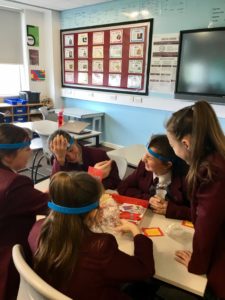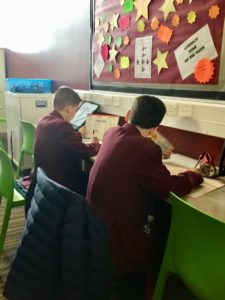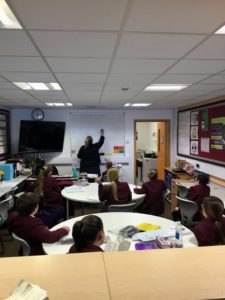Special Educational Needs and Disabilities (SEND)
SENDCo: Miss C Thwaite
Inclusion Manager and Lead of Alternative Education: Mrs C Finn
(0151 477 8860/office@lordderbyacademy.co.uk)
Parents of pupils with special needs and disabilities are no different to any other parents in that you are looking for an environment where your child is most likely to thrive, where they will feel happy, safe and secure and benefit from the kind of teaching, support and pastoral care that enables them to reach their potential.
Our Vision
At Lord Derby Academy, our vision is for all pupils with SEND to have the best start in life, thrive, aim high and achieve their potential. We ensure that pupils with SEND have equal access to a broad and balanced curriculum and we strive to prepare them to flourish and embrace the next stages of their education. This starts with high-quality teaching for all pupils in the classroom.
Knowsley’s SEND Strategy 2023-2026 sets out how it intends to support schools in the Local Authority in this vision by working in partnership with children, young people and their families. This will be achieved by addressing five key priorities:
- Joint working across all SEND services, partners and families
- Co-production with children and young people with SEND and their parents/carers
- Improve education, health and care outcomes for children and young people with SEND
- Ensure all young people with SEND make a successful transition to adulthood
- Improve the quality of Education Health and Care Plans
In January 2022, the school was inspected for the third time as part of the Inclusion Quality Mark award. The assessor expressed that “Having discussed the progress made since the last IQM review and the school’s plans for the future, I am of the opinion that the school should continue to hold Centre of Excellence status and be reviewed again in 12 months’ time”.
The assessor also quoted in her report a comment from Knowsley Education Improvement Officer-SEND Education Improvement and Inclusion: “this is a school and a team that really have the young people at the heart of everything they do…once a pupil is a Lord Derby pupil, they are nurtured, they are nurtured, cared for and looked after and they are supported until they leave the school”.
The Inclusion team
The Inclusion team is led by the SENDCO, Ms Thwaite and the Lead of Alternative Education, Mrs Finn. Mrs Ellis, Deputy Headteacher, line-manages SEND and Miss Pope, Assistant Headteacher manages Inclusion. Mrs Keaton is the SEND Administrator and Miss Jones is our Inclusion Support Officer. The team also includes 28 Teaching Assistants and a part-time Educational Psychologist who also works in our 2 local Trust primary schools. As well as having school-based support in place, the school aims to work in partnership with other agencies in order to provide an integrated support based on the needs of the pupil including:
- The Child and Mental Health Services (CAMHS) support
- The Knowsley Attendance Officer
- Speech and Language Service
- Occupational Therapy
How we operate
- We have effective management systems and procedures in place for SEND, taking into account the current Code of Practice (2015).
- We have successful communication between teachers, pupils with SEND, parents of SEND pupils, Teaching Assistants and outside agencies.
- We acknowledge and draw on parents’ knowledge and expertise in relation to their own child. Regular communication takes place in the form of meetings both face to face, virtual and telephone calls. Parents are kept informed of their child’s progress and behaviour daily via a home/school report card and Bromcom. Parents are consulted via a questionnaire throughout the academic year to gather their views, enabling us to improve our service and better meet the needs of their children.
- Through meetings with parents, the pupils are encouraged to take an increasingly active role in their targets, progress and next steps.
- We are committed to developing the knowledge and skills of all the staff to manage the challenges of the range of needs in the school, and to ensure that all support is of high quality
- We have an effective review cycle which allows us to monitor, review and plan for the next steps of development based on the ASSESS PLAN DO REVIEW cycle
The Inclusion department provides academic, behaviour and wellbeing support service to pupils across all year groups at LDA.

Our Inclusion packages share the following aims and purpose:
- To support emotional wellbeing and resilience and identify challenges to learning and specific needs.
- To support pupils’ behaviour and progress.
- To provide welfare/pastoral support to all pupils through personalised targeted support interventions.
- To provide academic support
- To maintain our extremely low number of fixed term/permanent exclusions
- To reduce pupils educated in off-site Alternative Provision
- To provide advice, support and training to all staff in relation to pastoral support, emotional wellbeing and behaviour management.
All pupils identified and referred receive a 1:1 support and advice session during their stay. This is used to determine the support package required. Individuals are assessed in an initial 1:1 session or through Inclusion meetings to determine an ongoing programme of support.

- Bespoke Teaching Assistant support
- Bespoke timetables
- Homework Club
- Lunchtime club
- Dyslexia support
- Multi Agency Intervention:
– Children and Young People’s Mental Health Service (CYPMHS) – click here
– Autistic Spectrum Condition (ASC) Specialist Teacher
– Family First – click here
– Early Help Team – click here
– Hearing Impaired Service, Visually Impaired Service
– Children with Disabilities Services – click here
– Merseyside Youth Association – MYA

The Well-being group provides support for pupils who are experiencing difficulty accessing their education in the main building due to emotional/mental well-being issues. This provision is bespoke to meet the individual need of a pupil and lasts for a half term when a placement review takes place to plan for next steps. A range of needs are addressed during these sessions including, anxiety, depression, self-harm, anorexia etc.

The PDI intervention provides support for pupils who are experiencing difficulty accessing their education in the main building. This is a weekly provision that lasts for a half term. Pupils access one to one sessions throughout the week to address the challenges that they are experiencing in order for them to access their learning and thrive in a main stream setting.
Interventions:
- Emotional regulation
- Social skills
- Anxiety
- Anger
- Confidence building
- Well-being
- Raising self-esteem

The Personalised Learning Environment supports pupils who, for a range of reasons, have challenges that affect their learning. This provision takes place five days per week for 5 hours per day. As well as delivering the curriculum, we look to identify the barriers and address the reasons behind their behaviour to provide them with the skills that they need to succeed.
We offer several intervention packages, each offering bespoke flexible support for the individual learner.
The aim of the PLE team is to create a happy and harmonious environment which encourages engagement of learning and allows pupils to make their expected progress. Working with parents, carers and teaching staff from the main school and the pastoral team, it is always the intention that pupils return to lessons in the main building when they are ready.
Why are pupils referred to the PLE?
Pupils are referred to the department when a graduated and thorough package of pastoral support has been exhausted and pupils continue to experience challenges that impact on their learning.
How are pupils referred to the PLE?
A panel made up of year managers, pupil support managers, SENDCO, attendance, safeguarding officer and the inclusion manager meet fortnightly to allow the team to discuss the next steps for each pupil who has been identified as needing further intervention.
Once a referral has been made at the Inclusion panel meeting it is discussed with Inclusion leaders when the best interest of the pupil is given great consideration before a decision is made. The aim is always to ensure that the provision has the pupil’s best interests at heart.

Education for pupils who, because of exclusion, illness or other reasons, would not otherwise receive suitable education; education arranged by schools for pupils on a fixed period exclusion; and pupils being directed by schools to off-site provision to improve their behaviour.
We work with a range of providers of alternative provision who are registered as independent schools:
- Harmonize Academy – OFSTED OUTSTANDING
- Everton Free School in Liverpool – OFSTED GOOD – click here for report
- Meadow Park in Stockbridge Village – OFSTED GOOD – click here for report
- Peregrinate
- Next Gen
How pupils with Special Needs are Identified
The school regards a child as having special education needs and disabilities “If they have a learning difficulty which calls for special educational provision to be made for them. Pupils have a learning difficulty if they: have a significantly greater difficulty in learning than the majority of pupils of the same age; or have a disability which prevents or hinders them from making use of educational facilities of a kind generally provided for pupils of the same age in schools or post-16 institutions within the area of the local education authority”. – (Taken from the code of Practice 2014). To identify and assess the needs of pupils with SEN, the school uses the following information:
- Liaison with primary schools/previous school.
- Whole school internal monitoring and assessment – SENDCO, Class Teachers, Pastoral Team.
- Literacy (spelling and reading) testing for all upon transition to Year 7.
- Use of CAT data.
- Assessment during interventions, including Snap-B profiling.
- Reports from professionals.
The school responds to requests from parents, pupils and teachers to assess the needs of a child (where appropriate). Testing is available using:
- GL Cognitive Ability Tests (CAT) of Verbal, Quantitative, Non-verbal and Spatial reasoning.
- Lucid screening (memory, literacy, reasoning).
- BPVS language screening
- Snap-B Profile.
- Further diagnostic tests are used in Years 9-11 to determine if a pupil requires access arrangements for examinations.
A copy of the Knowsley SEND Offer is available here; it clarifies who is responsible for services for SEND children and young people and gives you the information you need to ensure your SEND child can thrive


